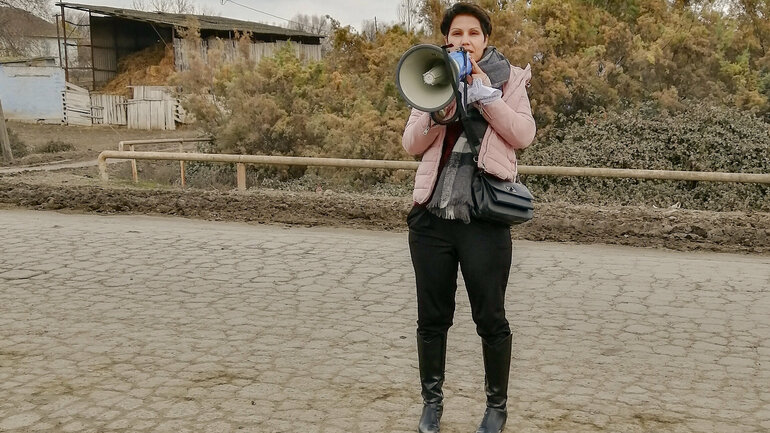Young feminists in Azerbaijan find a voice

Azerbaijan’s virtual and public spaces have experienced an unprecedented boost in feminist rhetoric over recent years. Activists, represented mainly by millennials and Generation Z, are using social media to spread the word about the true essence of feminism, discuss gender issues, and promote call-out culture by exposing injustices. On numerous social networks, campaigners are spreading the fundamental idea that men and women are born equal and should thus be entitled to the same opportunities and treatment.
Most of these networks operate as intellectual platforms on which activists share lectures, podcasts, live discussions, and Azerbaijani translations of feminist classics. Yet there is a growing urge to step out of the virtual space and bring feminism to the country’s political realm. In December 2019 and February 2020, feminist groups supported female activists in Azerbaijan’s municipal and parliamentary elections, respectively. The groups’ joint efforts helped one woman, Vafa Nagi, become the first independent feminist candidate to be elected to municipality in the country.
When feminists are elected
Nagi is a female activist from a small village 200 kilometres from Azerbaijan’s capital, Baku. After graduating from university in Turkey, she returned to her village and started a social enterprise by opening a sewing workshop and providing jobs for women. Witnessing injustices and corruption, mainly related to the illegal privatisation of communal land by the head of the Municipal Council over the past decade and violence against women, she decided to help the villagers stand up for their rights. Nagi stood as a candidate in the December 2019 municipal elections, in which she led a brave campaign by walking the streets with a megaphone to encourage people to participate in the elections and vote for her.
But winning a seat on the municipal council brought new challenges, as her attempts to increase transparency and accountability were greeted with smear campaigns and lawsuits. Nagi used social media to share information about corruption cases well beyond her constituency. As a result, her antagonists filed a lawsuit against her and tried to ruin her reputation by posting photos from her social media accounts around the village in an effort to shame her for wearing shorts and camisole tops. This was an attempt not only to silence her but also to call attention to the responsibilities of the male members of her household, whose neglect had, in her critics’ view, allowed her to cross unacceptable boundaries.
Nagi’s requests for the authorities to investigate the case and bring those responsible to account remain unanswered. What is more, she was soon dismissed as a member of the municipal council and now plans to restore her rights in court.
Women, feminism, and political representation
While Azerbaijan’s political establishment reaffirms its commitment to promote women’s empowerment in the country mainly through economic development programmes, it continues to have negative attitudes towards feminism. For instance, Hijran Huseynova, a former chair of the State Committee for Family, Women, and Children’s Affairs and now a member of parliament, continuously denied the need for feminist activism in Azerbaijan: ‘Sometimes, drawing parallels with other countries, I say that there were no feminists in Azerbaijan because we, women, were given equal rights with men.’
Azerbaijan’s constitution reaffirms the equal treatment of men and women and rejects discrimination. However, two recent laws on gender equality and the prevention of domestic violence lack implementation mechanisms and thus remain declarations of intent rather than serious commitments. The number of women in the highest echelons of government continues to be insignificant. There are no female ministers in the country, and the only woman in the cabinet is the chair of the State Committee for Family, Women, and Children’s Affairs. The highest political rank occupied by a woman is vice president, to which first lady Mehriban Aliyeva was appointed in 2017. However, in this capacity she insists on her role as a supporter to her husband rather than an independent player.
Azerbaijan currently has twenty-two female members of parliament out of a total of 125. But their presence is hardly noticed given the questionable independence of the legislative branch from the executive. The only level at which women have managed to significantly advance their presence is that of the municipalities. The proportion of municipal council seats occupied by women increased almost tenfold from 4 per cent in 2004 to 38.8 per cent in 2019. Yet municipalities are considered Azerbaijan’s weakest institutions as they are disempowered and underfunded.
In contrast, the representation of women in local executive authorities, which are the real power holders at the regional level, is insignificant: only one of Azerbaijan’s eighty-eight local executive authorities is headed by a woman. In an effort by the authorities to address the under-representation of women in decision-making bodies, there is a new trend to appoint women as deputy heads of executive committees. However, these appointments do not strengthen the mandates of female politicians but merely grant them access to the power controlled by men.
Future prospects
The case of Vafa Nagi shows that feminist activists in Azerbaijan should be prepared not only for political clashes but also for open discrimination from male colleagues and even threats to their personal security. The country’s current political system offers women subordinate roles and expects them to play by the system’s rules. These secondary roles no longer satisfy feminist activists, who have begun to raise their voices, form solidarity networks, and embrace both conventional and ingenious forms of political engagement. But while the inclusion of feminists in Azerbaijan’s political institutions appears to be an exception rather than the rule, they continue to use online platforms to convey alternative discourses and organise around critical causes.
Yuliya Aliyeva is an independent consultant on gender and social development issues based in Azerbaijan.